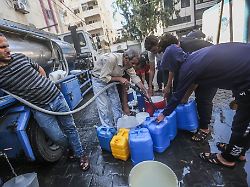Blockade of the Gaza Strip
Ambassador: Hamas responsible for water supply, not Israel
October 16, 2023, 1:49 p.m
Listen to article
This audio version was artificially generated. More info | Send feedback
In the fight against Hamas in the Gaza Strip, Israel is cutting off electricity, water and food supplies to the Gaza Strip. This leads to criticism that Israel is violating international law. However, one of the country’s ambassadors blames Hamas.
In an interview with the BBC, Israel’s ambassador to Great Britain defended herself against allegations that her country was violating international law by turning off water supplies to Gaza. “Israel left the Gaza Strip in 2005. According to international law, one must have active control over an area to be responsible for these supplies,” said Tzipi Hotovely. Hamas has active control in Gaza. Therefore, it is also responsible for the water supply.
Hotovely also defended the Israeli bombing of Gaza. The 1,400 people in Israel murdered by Hamas received no warning like the one Israel gave, she said. She also compared Hamas’ atrocities to those of the Islamic State terrorist militia. She added that Britain accepted the deaths of hundreds of thousands of civilians in Germany during World War II “because they knew it was the only way to defeat the Nazis.”
After the massive terrorist attack by the Islamist Hamas more than a week ago, Israel cut off electricity, water and food supplies to the Gaza Strip. In preparation for a ground offensive, Israel called on the population of the northern Gaza Strip to leave the area to the south. More than 600,000 people have already fled.
According to OCHA, people in Gaza currently only have an average of three liters of water available per day for drinking, cooking and washing. Israel restored water supplies to part of the southern Gaza Strip town of Khan Younis on Sunday, the situation report said.
UN refers to international law
The UN High Commissioner for Human Rights, Volker Türk, said after the terrorist attacks on Israel: “Indiscriminately firing rockets into Israel and taking people hostage is a clear violation of international humanitarian law.” However, Türk also pointed out that international humanitarian law prohibits denying people what they need to survive. “A lockdown amounts to collective punishment, which is prohibited under international humanitarian law,” said UN Human Rights Office spokeswoman Ravina Shamdasani.
However, international law expert at the University of Basel, Anna Petrig, said: “In principle, siege is not a forbidden method of war.” But if the goal was to starve the population, it would be illegal and even a war crime. “But there are gray areas,” said the expert.
Israel occupied the Gaza Strip during the Six-Day War in 1967. In 2005, Prime Minister Ariel Sharon ordered the withdrawal and evacuation of the settlements. In 2007, Hamas took control of the Mediterranean coastal area after a bloody battle with Palestinian President Mahmoud Abbas’s Fatah organization. The two neighboring countries, Israel and Egypt, then imposed a blockade.
